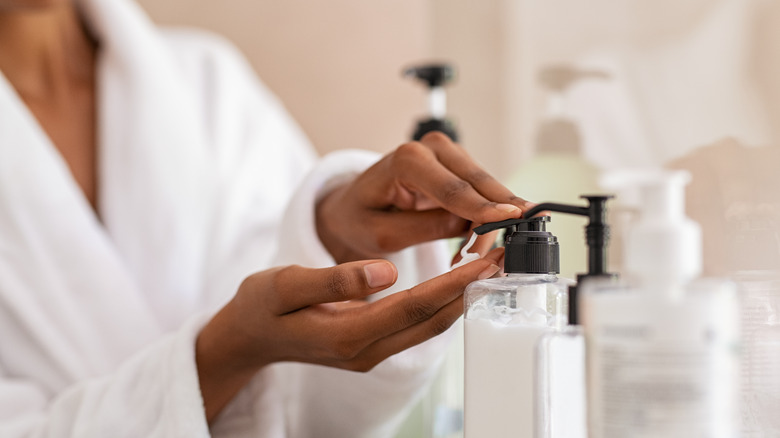Easy Ways To Keep Your Hands Feeling Soft And Moisturized
You may have washed your hands a lot over the past year. Between harsh soaps and warm water, your hands can be left feeling parched over time. While lotion is the obvious solution, there are other ways to ensure that your skin is still supple, no matter what your day looks like.
According to Mindbodygreen, your hands are among the first places on your body to start showing signs of dehydration. After all, we use them in most interactions. But, beyond washing your hands too much, other issues could be to blame. The outlet notes that different types of weather can leave your skin flaky and dry. Dry weather and lots of cold air can weaken your moisture barrier, making it easier for hydration to slip out. Plus, as you age, your body doesn't produce as many of the chemicals that keep your skin feeling soft. Hyaluronic acid, elastin and collagen all take a dip after a while, according to the outlet. Without these substances, your moisture barrier weakens and more easily allows hydration to seep out of your skin.
Lastly, other skin-based issues could be behind your scales. Hadley King, MD, explains, "Hand eczema, or hand dermatitis, is characterized by redness, blistering, cracking, flaking, and itching of the palms and fingers." If this sounds familiar, this could be you.
Apply lotion after every time you wash your hands
There's a reason that many soap packages come in sets with bottles of lotion attached — we need both of them. Indeed, fortifying your moisture barrier will even help fight infections. "Keeping your skin healthy and hydrated is important to prevent infections," dermatologist, Debra Wattenberg, tells TODAY. "Look for creams and ointment with a higher percentage of oil. The more occlusive the better, but choose a tube or pump over a tub to avoid contamination."
Mindbodygreen suggests purchasing a thick cream that seals in moisture while providing the natural lubricants that keep your skin feeling soft. "It's essential to moisturize as often as possible to restore those lipids and encourage the regrowth of healthy bacteria, or your microbiome," Whitney Bowe, MD, explains to the outlet. Use your cream after you've been in the shower or washed dishes. Consider adding rubber gloves to your cleaning routine to protect your cells from harsh chemicals and hot water as you scrub.
Lastly, choose the right soap. "Ideal soaps are made without harsh sulfates like sodium lauryl sulfate, that can damage the skin barrier," Bowe reveals. "I also love seeing hand soaps that are enriched with soothing, hydrating ingredients like milk, aloe, honey, and oatmeal. Also, any ingredients that restore the barrier and help bring the pH back to the normal range — slightly acidic — are imperative."

